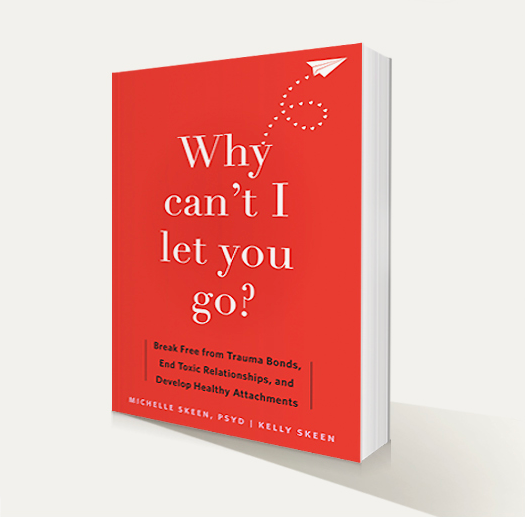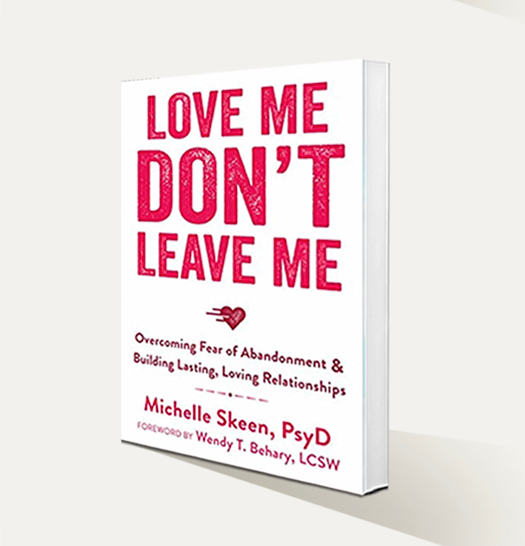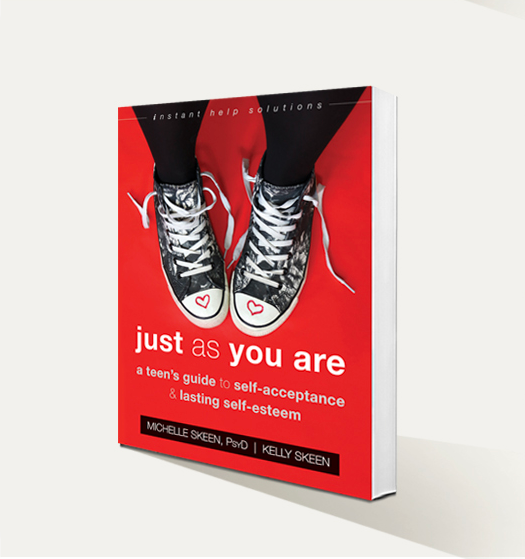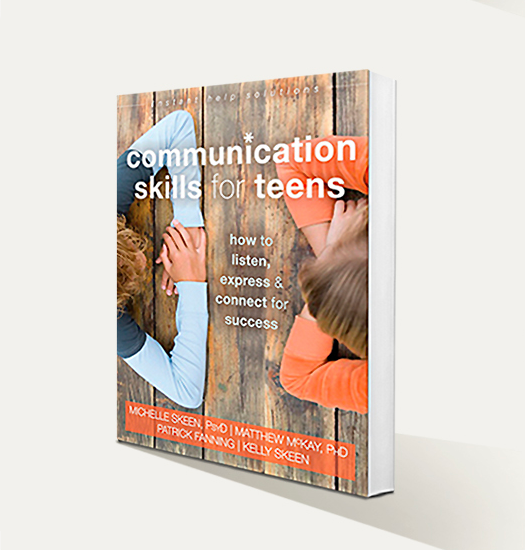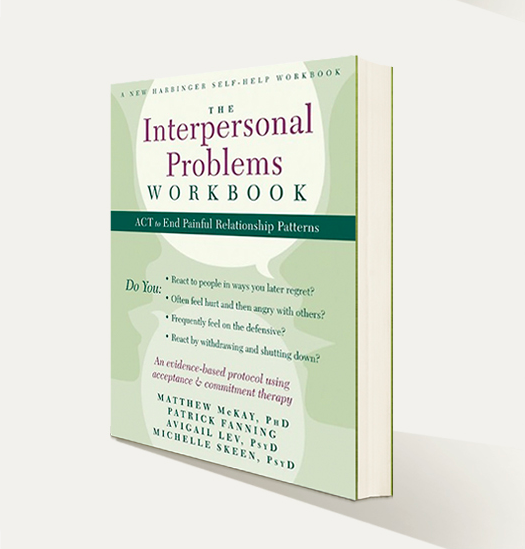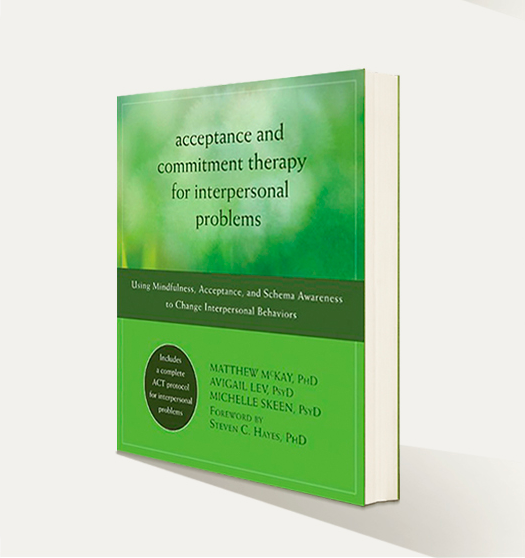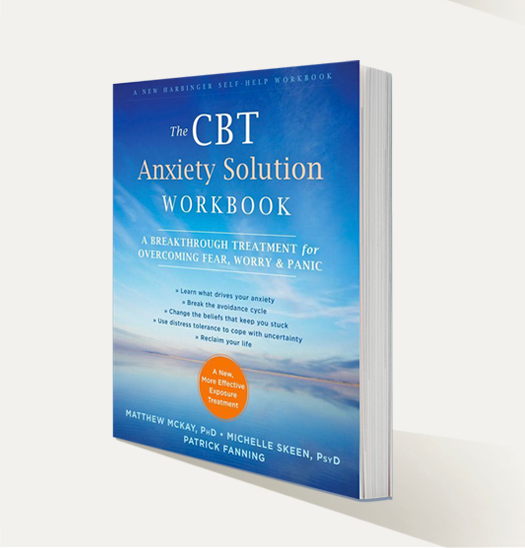My radio show on Thursday November 15, 2018
This week on Relationships 2.0 my guest is Mitch Abblett PhD (PART 2) author of The Five Hurdles to Happiness and the Mindful Path to Overcoming Them
 About the book: A practical approach to becoming aware of the “five hindrances”–the negative qualities that inhibit living the awakened life–and to breaking free of them in order to live more mindfully, effectively, compassionately. Five obstacles stand in between you and true happiness. What are they and how can you overcome them? Buddhist traditions teach that there are five negative qualities, or hindrances, that inhibit people from living an awakened life. Here, Mitch Abblett gives this teaching a modern, secular interpretation and helps you identify the hurdles that are blocking your contentment—desire, hostility, sluggishness, worry, and doubt—and how you can take your first steps to overcoming them. Combining traditional wisdom with contemporary psychology and using examples from his psychotherapy practice, Abblett uses the hurdles as a frame for engaging you in a process of contemplating your own life and learning to lean into your experience rather than merely repeating bad habits. By doing this, you can break free from the hurdles and live more mindfully, effectively, and compassionately.
About the book: A practical approach to becoming aware of the “five hindrances”–the negative qualities that inhibit living the awakened life–and to breaking free of them in order to live more mindfully, effectively, compassionately. Five obstacles stand in between you and true happiness. What are they and how can you overcome them? Buddhist traditions teach that there are five negative qualities, or hindrances, that inhibit people from living an awakened life. Here, Mitch Abblett gives this teaching a modern, secular interpretation and helps you identify the hurdles that are blocking your contentment—desire, hostility, sluggishness, worry, and doubt—and how you can take your first steps to overcoming them. Combining traditional wisdom with contemporary psychology and using examples from his psychotherapy practice, Abblett uses the hurdles as a frame for engaging you in a process of contemplating your own life and learning to lean into your experience rather than merely repeating bad habits. By doing this, you can break free from the hurdles and live more mindfully, effectively, and compassionately.
About the author: Dr. Mitch Abblett is a clinical psychologist, author, consultant and speaker. As a clinician, his services focus on work with children, teens, parents, families and adults with whom he creates solutions for a range of concerns or desired growth areas. A clinician in the Boston area for over 15 years, he brings a wealth of clinical experience from various settings (hospitals, outpatient clinics, residential facilities and therapeutic schools) to his practice. For 11 years he served as the Clinical Director of the Manville School at Judge Baker Children’s Center in Boston – a Harvard-affiliated therapeutic school program for children and adolescents with emotional, behavioral and learning difficulties. He has also served as the Executive Director of the Institute for Meditation and Psychotherapy. As a consultant and speaker, Dr. Abblett empowers changes clients through collaborative, tailored interventions. His consultative and training work focuses on mindfulness, compassion and value-driven action and empowering clients to communicate skillfully and authentically. He improves clients’ school and work effectiveness, reduces the effects of stress, and increases skills for health self-management and daily productivity. Dr. Abblett’s writing includes a mindfulness-based book for clinicians (The Heat of the Moment: Mindful Management of Difficult Clients; WW Norton & Co.), Mindfulness for Teen Depression and Helping Your Angry Teen (both with New Harbinger), five decks of mindfulness practice cards such as Growing Mindful: A Deck of Mindfulness Practices for All Ages: PESI Publishing). His upcoming book, The Five Hurdles to Happiness-and the Mindful Path to Overcoming Them will be released by Shambhala Publications in August 2018. He also blogs regarding mindfulness applications in family and relationships on Mindful.org.
My radio show on Tuesday March 24, 2015
This week on Relationships 2.0 my guest is Anthony Biglan, PhD author of The Nurture Effect: How the Science of Human Behavior Can Improve Our Lives and Our World.
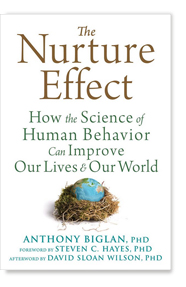 About the book:
About the book:
A fascinating look at the evolution of behavioral science, the revolutionary way it’s changing the way we live, and how nurturing environments can increase people’s well-being in virtually every aspect of our society, from early childhood education to corporate practices. If you want to know how you can help create a better world, read this book.
What if there were a way to prevent criminal behavior, mental illness, drug abuse, poverty, and violence? Written by behavioral scientist Tony Biglan, and based on his ongoing research at the Oregon Research Institute, The Nurture Effect offers evidence-based interventions that can prevent many of the psychological and behavioral problems that plague our society.
For decades, behavioral scientists have investigated the role our environment plays in shaping who we are, and their research shows that we now have the power within our own hands to reduce violence, improve cognitive development in our children, increase levels of education and income, and even prevent future criminal behaviors. By cultivating a positive environment in all aspects of society—from the home, to the classroom, and beyond—we can ensure that young people arrive at adulthood with the skills, interests, assets, and habits needed to live healthy, happy, and productive lives.
The Nurture Effect details over forty years of research in the behavioral sciences, as well as the author’s own research. Biglan illustrates how his findings lay the framework for a model of societal change that has the potential to reverberate through all environments within society.
About the author:
Anthony Biglan, PhD, is a senior scientist at Oregon Research Institute and a leading figure in the development of prevention science. His research over the past thirty years has helped to identify effective family, school, and community interventions to prevent all of the most common and costly problems of childhood and adolescence. He is a leader in efforts to use prevention science to build more nurturing families, schools, and communities throughout the world. Biglan lives in Eugene, Oregon.
In recent years, his work has shifted to more comprehensive interventions that have the potential to prevent the entire range of child and adolescent problems. He and colleagues at the Center for Advanced Study in the Behavioral Sciences published a book summarizing the epidemiology, cost, etiology, prevention, and treatment of youth with multiple problems (Biglan et al., 2004). He is a former president of the Society for Prevention Research. He was a member of the Institute of Medicine Committee on Prevention, which released its report in 2009 documenting numerous evidence-based interventions that can prevent multiple problems.
My radio show on Tuesday March 17, 2015
This week on Relationships 2.0 my guest is Karen Koenig, author of Nice Girls Finish Fat: Put Yourself First and Change Your Eating Forever.
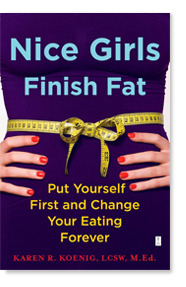 About the book:
About the book:
From a therapist and expert in emotional eating, the first book to explore the link between weight gain and women who do too much, complete with proven techniques for dropping pounds.
Many women put too much on their plates, both literally and figuratively. In Nice Girls Finish Fat, psychotherapist Karen R. Koenig explains the link between the two and gives overweight women detailed advice on how to lose their extra baggage—both emotional and physical—by becoming more assertive in every aspect of life. For the millions of overweight women in America, diet and exercise just aren’t cutting it. That’s because many of these women have emotional issues buried deep beneath those stubborn pounds, issues that must be dealt with first if weight loss plans are to succeed. In this illuminating book, based on decades of professional experience, Karen Koenig offers on-the-page psychotherapy to help readers attack the roots of their food problems. With her engaging personal style, she teaches women about the biological connections between repressed emotions and eating, revealing the ways many women use food to stuff their anger, control their aggression, and assuage their feelings of guilt—all in the pursuit of being “nice.” Giving “good girls” permission to love themselves first, Koenig offers thought-provoking quizzes and questions to help readers identify and overcome the habits that have been holding them back. Empowering readers to gain the confidence they need to lose weight, Nice Girls Finish Fat not only shows women how to stop obsessing about food and develop healthy eating habits, it teaches readers skills to improve every aspect of their lives.
From the author:
I am a psychotherapist, national educator, international author, and an expert on the psychology of eating—the how and why, not the what, of it. For more than three decades, my mission has been to help people with eating and weight problems learn to eat “normally” and maintain a healthy, stable weight for life without dieting and deprivation. My therapy practice is in Sarasota, FL, where I do tele-coaching and Skype consultation worldwide. As a recovered chronic dieter and binge-eater, I meld my personal recovery wisdom with my professional knowledge and experience to resolve eating problems.
Is Fear of Abandonment Hurting Your Relationships?
by Michelle Skeen, PsyD
OMTimes
Understanding Your Fears and Changing the Behaviors that are Sabotaging Your Love Life
Everyone longs for closeness and long-term relationships, but too many people find themselves alone – pushing partners away, leaving before they can be left, or consistently choosing the wrong mates. In her new book, LOVE ME, DON’T LEAVE ME: Overcoming Fear of Abandonment & Building Lasting, Loving Relationships (New Harbinger/September 2014), psychologist Michelle Skeen, PsyD, reveals how fear of abandonment sabotages relationships. She offers a powerful guide to working through long-standing fears and changing behaviors that impede healthy connections with others.
Skeen begins by explaining how childhood experiences set the stage for the “core beliefs” that underlie people’s self-perceptions and how they interact with others. “Any one of an array of scenarios – your parents’ divorce, the loss of someone important to you (or that person being with you inconsistently or unpredictably), being overprotected, having an alcoholic or drug-addicted parent – can leave you feeling disconnected, alone – abandoned,” says Skeen. In turn, these core beliefs shape the way individuals respond to those around them, she writes.
“When your core beliefs get triggered by a situation or interaction that reminds you of a painful experience from your childhood, you often react in ways that perpetuate these experiences,” she continues. For example, if someone you are dating doesn’t respond to a phone call immediately, and you react by becoming clingy due to your fear of abandonment, you may well push that person away – confirming your prediction that he or she will leave you.
LOVE ME, DON’T LEAVE ME describes how understanding your story, and how it is affecting the present, enables you to change your relationships moving forward. Skeen’s step-by-step process begins with uncovering your underlying core beliefs by using the self-assessments in the book (and on www.lovemedontleaveme.com), and journaling as the author suggests. These harmful beliefs include abandonment, mistrust and abuse, emotional deprivation (the belief that you won’t receive the support that you need), defectiveness (the feeling that you are unworthy and unlovable), and failure (the sense that you don’t measure up). Skeen also points out the kinds of destructive reactions these beliefs often engender, and the types of people that are likely to trigger these responses – such as those who are unpredictable, unavailable, detached, judgmental, or ego-driven.
With multiple examples, Skeen walks readers through developing the skills they need to distance themselves from their core beliefs. These include:
Mindfulness – Cultivating awareness of your behaviors gets you out of your limited mindset and allows you to make behavioral choices rather than defaulting to habitual responses. Skeen recommends such mindfulness exercises as taking a walk, consciously noticing your own sensations as well as what is around you, and then recording your experience in a journal.
Letting Go of What You Can’t Change – The pain engendered by past experiences won’t go away, says Skeen. The key is to accept the pain that emerges when your core beliefs get triggered, and then change your behavior in reaction to this pain. “You need to begin to see your experience as transitory,” the author writes.
Identifying and Committing to Your Values – “By getting in touch with your core values and committing to living a values-driven life, you can stop resorting to your old core belief-driven behaviors,” explains Skeen. For example, valuing intimacy and openness is in direct conflict with withholding the “real you” from your partner due to fear of rejection.
Managing Your Emotions – Emotional pain is what drives people to engage in unhelpful coping behaviors, declares Skeen. “You can’t eliminate negative feelings, but by accepting them rather than trying to control them, you can use them to help you learn and grow,” she writes. LOVE ME, DON’T LEAVE ME details a variety of ways to deal with painful emotions when they surface, from exercising to volunteering, and from taking care of items on your “to do” list to getting a manicure or facial.
“My ultimate goal in writing this book is to get you to a place where you can be present in a relationship without being controlled by your fears,” says Skeen. By using the information and skills she shares in LOVE ME, DON’T LEAVE ME, readers can get closer to the healthy relationships that they desire.
About the Author:
Michelle Skeen, PsyD, is a therapist who lives and works in San Francisco, CA. She has provided brief and long-term therapy for individuals and couples utilizing schema, cognitive, and behavioral therapies to address interpersonal issues, weight management, anger, depression, anxiety, disabilities, and trauma. She is author of The Critical Partner and coauthor of Acceptance and Commitment Therapy for Interpersonal Problems. Skeen hosts a weekly radio show called Relationships 2.0 with Dr. Michelle Skeen on KCAA 1050 AM. To find out more about Skeen, visit her website at www.michelleskeen.com.
Read it on OMTimes
My radio show on Tuesday February 17, 2015
This week on Relationships 2.0 my guest is Karen Koenig author of The Food and Feelings Workbook: A Full Course Meal on Emotional Health.
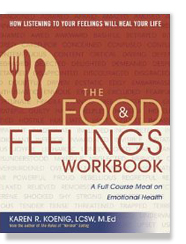 About the book:
About the book:
An extraordinary, powerful connection exists between feeling and feeding that, if damaged, may lead to one relying on food for emotional support, rather than seeking authentic happiness. This unique workbook takes on the seven emotions that plague problem eaters — guilt, shame, helplessness, anxiety, disappointment, confusion, and loneliness — and shows readers how to embrace and learn from their feelings. Written with honesty and humor, the book explains how to identify and label a specific emotion, the function of that emotion, and why the emotion drives food and eating problems. Each chapter has two sets of exercises: experiential exercises that relate to emotions and eating, and questionnaires that provoke thinking about and understanding feelings and their purpose. Supplemental pages help readers identify emotions and chart emotional development. The final part of the workbook focuses on strategies for disconnecting feeling from food, discovering emotional triggers, and using one’s feelings to get what one wants out of life.
About the author:
I am a psychotherapist, national educator, international author, and an expert on the psychology of eating–the how and why, not the what, of it. For more than three decades, my mission has been to help people with eating and weight problems learn to eat “normally” and maintain a healthy, stable weight for life without dieting and deprivation. My therapy practice is in Sarasota, FL, where I do tele-coaching and Skype consultation worldwide. As a recovered chronic dieter and binge-eater, I meld my personal recovery wisdom with my professional knowledge and experience to resolve eating problems.
My books are Nice Girls Finish Fat, The Rules of “Normal” Eating, The Food and Feelings Workbook, and What Every Therapist Needs to Know About Treating Eating and Weight Issues.
My radio show on Tuesday January 13, 2015
This week on Relationships 2.0 my guest is Karen Koenig, author of Outsmarting Overeating: Boost Your Life Skills, End Your Food Problems.
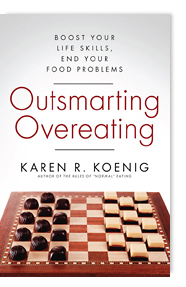 About the book:
About the book:
The reason you turn to food when you’re stressed or distressed is that you don’t have better ways of managing life’s ups and downs. According to Karen R. Koenig, an expert on the psychology of eating, you can transform your eating habits—and your life—by developing effective life skills. When you have enhanced skills, you won’t need to turn to mindless eating to make it through the day and will get the best out of life rather than letting life get the best of you. With Koenig’s guidance, you’ll learn how to establish and maintain functional relationships, take care of yourself physically and emotionally, think rationally, and create a passionate, joyful, and meaningful life. When these behaviors take root and become automatic, food becomes what it is meant to be: nourishment and one of life’s many pleasures.
About the author:
I am a psychotherapist, national educator, international author, and an expert on the psychology of eating—the how and why, not the what, of it. For more than three decades, my mission has been to help people with eating and weight problems learn to eat “normally” and maintain a healthy, stable weight for life without dieting and deprivation. My therapy practice is in Sarasota, FL, where I do tele-coaching and Skype consultation worldwide. As a recovered chronic dieter and binge-eater, I meld my personal recovery wisdom with my professional knowledge and experience to resolve eating problems.
My books are Nice Girls Finish Fat, The Rules of “Normal” Eating, The Food and Feelings Workbook, and What Every Therapist Needs to Know About Treating Eating and Weight Issues.
My radio show on Tuesday January 6, 2015
This week on Relationships 2.0 my guest is William Powers, author of New Slow City: Living Simply in the World’s Fastest City.
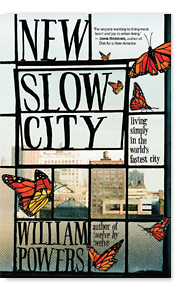 About the book:
About the book:
Burned-out after years of doing development work around the world, William Powers spent a season in a 12-foot-by-12-foot cabin off the grid in North Carolina, as recounted in his award-winning memoir Twelve by Twelve. Could he live a similarly minimalist life in the heart of New York City? To find out, Powers and his wife jettisoned 80 percent of their stuff, left their 2,000-square-foot Queens townhouse, and moved into a 350-square-foot “micro-apartment” in Greenwich Village. Downshifting to a two-day workweek, Powers explores the viability of Slow Food and Slow Money, technology fasts and urban sanctuaries. Discovering a colorful cast of New Yorkers attempting to resist the culture of Total Work, Powers offers an inspiring exploration for anyone trying to make urban life more people- and planet-friendly.
About the author:
Powers new book New Slow City offers an inspiring exploration for anyone trying to make urban life more people- and planet-friendly.
Born and raised on Long Island, William Powers has worked for over a decade in development aid and conservation in Latin America, Africa, Native North America, and Washington, DC. He is a senior fellow at the World Policy Institute and is on the adjunct faculty of New York University. A third generation New Yorker, Powers has also spent two decades exploring the American culture-of-speed and its alternatives in some fifty countries around the world. He has covered the subject in his four books and written about it in the Washington Post and the Atlantic. An expert on sustainable development, he is a freelance writer and speaker. More information on his work can be found here: www.williampowersbooks.com.
Contact William directly: bill@williampowersbooks.com.
My radio show on Tuesday December 2, 2014
My guest this week on Relationships 2.0 is Marc Bekoff, PhD, author of Rewilding Our Hearts: Building Pathways of Compassion and Coexistence.
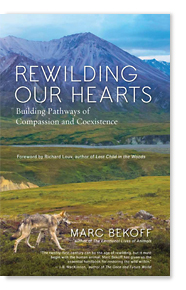 About the book:
About the book:
In wildlife conservation, rewilding refers to restoring habitats and creating corridors between preserved lands to allow declining populations to rebound. Marc Bekoff, one of the world’s leading animal experts and activists, here applies rewilding to human attitudes. Rewilding Our Hearts invites readers to do the essential work of becoming reenchanted with the world, acting from the inside out, and dissolving false boundaries to truly connect with both nature and themselves.
About the author:
Marc Bekoff is professor emeritus of ecology and evolutionary biology at the University of Colorado, Boulder. He is author of The Emotional Lives of Animals and Wild Justice, among many other titles. www.marcbekoff.com
My radio show on Tuesday November 25, 2014
My guest this week on Relationships 2.0 is Alan Fox, author of People Tools for Business: 54 Strategies for Building Relationships, Creating Joy and Embracing Prosperity.
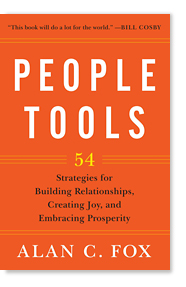 About the book:
About the book:
Getting along well with others is the real secret to success and happiness. In tens of thousands of classrooms we teach reading, writing, and arithmetic and yet we leave solutions to the universal problems of human relationships to be discovered, if at all, by trial and error. The trial is painful and the error is costly.
People Tools: 54 Strategies for Building Relationships, Creating Joy, and Embracing Prosperity, provides time-proven techniques that you can use to build a better, happier, more successful life. It is the perfect resource for busy people looking for fast and effective solutions to the challenges we face every day.
PRACTICAL WISDOM ON EVERY PAGE
People Tools are practical and easy to understand. From developing self-confidence, to improving communication skills, to finding constructive ways to resolve conflict, each People Tool addresses a specific issue and provides a simple, straightforward strategy that you can adopt to bring about a positive result. Some of the useful People Tools in the book include:
- The Belt Buckle. When words are different than action (The Belt Buckle), trust the Belt Buckle, not the words.
- Buy a Ticket. To make something good happen in your life you have to participate.
- Catching a Feather. An alternative to the endless chase, this Tool reveals how to attract people you want to be closer to.
- Patterns Persist. Prior actions are predictive of future behaviors.
- Catch Them Being Good. Rewards are more effective than punishments.
TIME-TESTED TOOLS TO ENHANCE YOUR WELLBEING
Although you may recognize the more intuitive techniques in People Tools, this sourcebook provides explanations and helpful examples from a vast collection of different tools designed to help you further expand your own existing repertoire of skills.
Open the book to any page and you will find a useful solution. Each tool is illustrated with insightful stories and amusing anecdotes that are relevant and relatable. The stories will reel you in but the advice will change your life.
About the author:
Alan Fox has enjoyed a number of lifetimes during the past seventy-two years. He has university degrees in accounting, law, education, and professional writing. He has been employed as a Tax Supervisor for a national CPA firm, established his own law firm, and founded a commercial real estate company in 1968 that now owns and manages more than seventy major income-producing properties in eleven states.
Fox is the founder, editor, and publisher of Rattle, one of the most respected literary magazines in the United States, and he sits on the board of directors of several non-profit foundations. People Tools is the distillation of his experience in accounting, law, real estate, poetry, three marriages, and raising six children, two step children, and one foster child.
My radio show on Tuesday November 18, 2014
My guest this week on Relationships 2.0 is Gina Vucci, co-author of The Relationship Handbook: A Path to Consciousness, Healing and Growth.
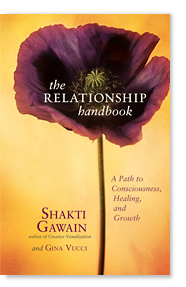 About the book:
About the book:
Using knowledge and skills honed over a lifetime of teaching and learning, personal development pioneer Shakti Gawain presents a powerful, life-changing work on a subject she has always been passionate about: our relationships. In her popular workshops and in her personal life, she has tested and refined the insights and exercises in this book, which she cowrote with her longtime collaborator Gina Vucci. Their approach reflects the fact that each of us is in relationships not only with romantic partners, family, coworkers, and children, but also with internal core beliefs and a variety of selves, including primary, disowned, and shadow selves.
These revelatory teachings incorporate strategies for becoming aware of hidden beliefs, applying the Voice Dialogue process developed by Drs. Hal and Sidra Stone, and learning to experience every relationship as a path to self-knowledge. Through her gentle guidance, Shakti shows us how every relationship we have at every moment can be seen as a path toward greater consciousness, healing, and growth.
There is no other book on relationships like this. Give this powerful book even a short amount of time and prepare yourself for some truly remarkable results!
About the co-author:
Gina has worked with Shakti Gawain, a pioneer in the field for personal growth, for more than 15 years. Gina co-leads workshops, facilitates groups and has contributed to Shakti’s best selling products including Developing Intuition, and revised editions of Creative Visualization and Living In The Light. Gina has been trained and certified in a number of counseling fields. She brings a deep level of experience, wisdom and joy to her work with others teaching, speaking, and writing.
Here is a snapshot of Gina: Gina is a “Soccer Mom.” She is a single mom raising three inspired children, a survivor of domestic violence, a sober alcoholic for over twenty six years, a mentor, a friend, an advocate, a seeker. Her journey has brought her to a place of knowing that life holds something extraordinary for each of us. Her faith and hope has brought insight and inspiration to many. Her passion is to support people in recognizing their true potential for joy, freedom and empowerment.
 About the book: A practical approach to becoming aware of the “five hindrances”–the negative qualities that inhibit living the awakened life–and to breaking free of them in order to live more mindfully, effectively, compassionately. Five obstacles stand in between you and true happiness. What are they and how can you overcome them? Buddhist traditions teach that there are five negative qualities, or hindrances, that inhibit people from living an awakened life. Here, Mitch Abblett gives this teaching a modern, secular interpretation and helps you identify the hurdles that are blocking your contentment—desire, hostility, sluggishness, worry, and doubt—and how you can take your first steps to overcoming them. Combining traditional wisdom with contemporary psychology and using examples from his psychotherapy practice, Abblett uses the hurdles as a frame for engaging you in a process of contemplating your own life and learning to lean into your experience rather than merely repeating bad habits. By doing this, you can break free from the hurdles and live more mindfully, effectively, and compassionately.
About the book: A practical approach to becoming aware of the “five hindrances”–the negative qualities that inhibit living the awakened life–and to breaking free of them in order to live more mindfully, effectively, compassionately. Five obstacles stand in between you and true happiness. What are they and how can you overcome them? Buddhist traditions teach that there are five negative qualities, or hindrances, that inhibit people from living an awakened life. Here, Mitch Abblett gives this teaching a modern, secular interpretation and helps you identify the hurdles that are blocking your contentment—desire, hostility, sluggishness, worry, and doubt—and how you can take your first steps to overcoming them. Combining traditional wisdom with contemporary psychology and using examples from his psychotherapy practice, Abblett uses the hurdles as a frame for engaging you in a process of contemplating your own life and learning to lean into your experience rather than merely repeating bad habits. By doing this, you can break free from the hurdles and live more mindfully, effectively, and compassionately.









